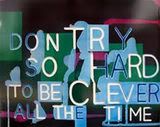 DREAMS
DREAMSFor some reason I've been able to remember nearly all of my dreams for the last week. Maybe it's all the turkey in my diet, or the whiskey-spiked soy egg nog. (Which, FYI, is the best thing to come out of the holiday season--ever--and that's a fact. I love soy egg nog so much that if I were to get a cut I would probably bleed soy egg nog).
Anyways. Dreams. Carl Jung said in "The Meaning of Psychology for Modern Man":
The dream is a little hidden door in the innermost and most secret recesses of the soul, opening into that cosmic night which was psyche long before there was any ego consciousness...in dreams we put on the likeness of that more universal, truer, more eternal man dwelling in the darkness of primordial night. There he is still the whole, and the whole is in him, indistinguishable from nature and bare of all egohood. It is from these all-uniting depths that the dream arises, be it never so childish, grotesque, and immoral.
I like the idea of being an "eternal man dwelling into the darkness of primordial night", however, if that's true, I think the "secret recesses" of my soul are really kinda superficial. I mean, take this one that I posted a few years ago. Also, here are some quotes and scenarios that have filled my sleeping state recently:
--"I don't mind walking the catwalk in a pumpkin suit, but I just hate it when they make you say 'thanks for the salad' before you do a turn." --unknown girl.
--"Put my love into the sauce you spread on all your friends." --I have NO idea who this dude was in my dream, but he said this to me. And I think he was wearing a Peter Pan costume.
--"I just came to deliver your mail. Yeah, I sing and work for USPS. Is Andy here?" --Emily Newsom, Joanna Newsom's sister, who my friend Andy claims he knows.
--In a dream that I had a few nights ago, me and my friend Crazy P are trying to catch a flight to Tokyo, but she has to stop at Starbucks first. We are already late to the airport, but she has to stop at a second Starbucks. Eventually we are over an hour late, and she must stop at the Starbucks at Dolores Park (which does not exist in real life, thank god). We miss our flight. The end.
--In my most recent dream, I am visiting my friend Sarah V at her new home in the Lower Haight which is an old dilapidated Victorian. She lets me do laundry there. She shares her laundry room with the rest of the building. From the window I can look up into the neighboring building to see a step aerobics class in session. One of Sarah's neighbors tells me that they are a cult of "perfect healthy living". I look up and say, "Shit! Is that a smoothie he is balancing on his head?" --Yes, the neighbor says, that is the instructor, he is trying to teach them how to balance a smoothie on their heads while doing step aerobics. The end.
In summary, here is a good comic from toothepastefordinner:









